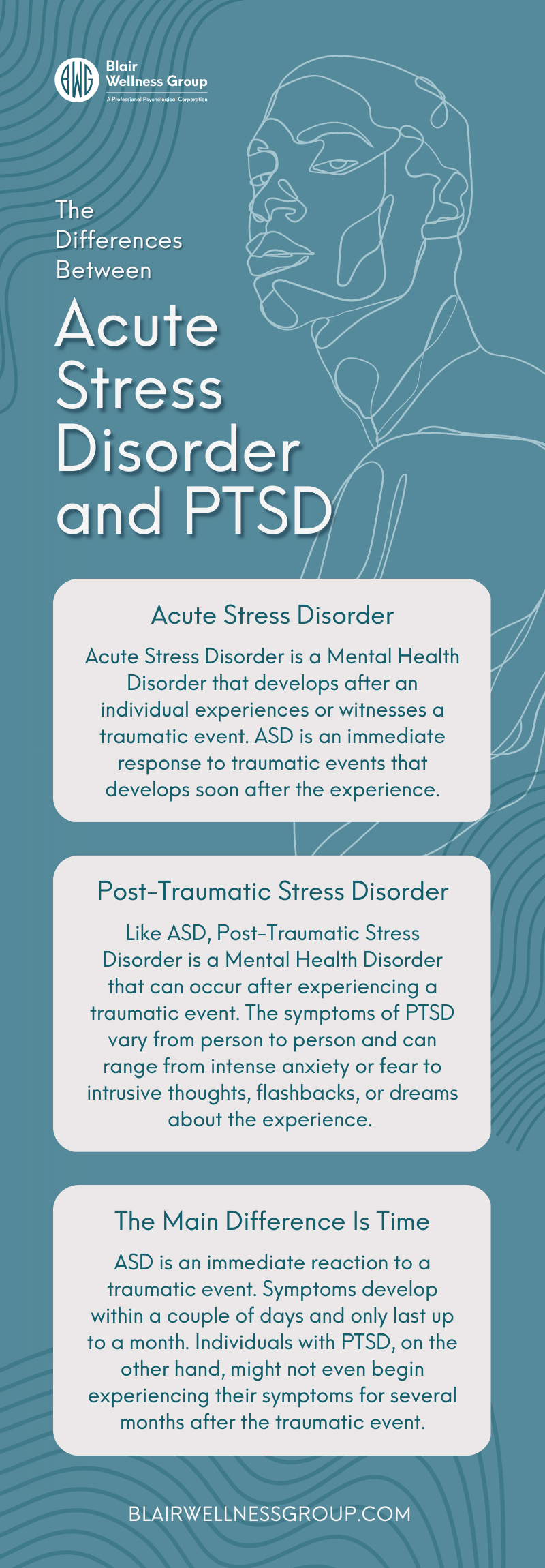Finding yourself in a situation that brings on emotional or physical distress can be an incredibly difficult experience to navigate, and the aftermath of these situations is often just as difficult. Trauma can lead to the development of a few different Mental Health Disorders, including Acute Stress Disorder (ASD) and Post-Traumatic Stress Disorder (PTSD). ASD is often seen as less severe than PTSD, but its symptoms are no less serious. Both conditions require professional attention for individuals to recover and heal from their trauma.
Understanding the differences between ASD and PTSD not only helps raise awareness about these Mental Health Disorders but also allows you to better prepare yourself to seek treatment. In this blog post, we will explore the differences between Acute Stress Disorder and PTSD to help equip you with the information you need for your own mental health journey.
Acute Stress Disorder
Acute Stress Disorder is a Mental Health Disorder that develops after an individual experiences or witnesses a traumatic event. ASD is an immediate response to traumatic events that develops soon after the experience.
Feelings of fear and distress are normal after a traumatic event. However, those feelings typically fade after a few days and don’t have a lasting effect on your well-being. People who suffer from ASD, on the other hand, often feel helpless and overwhelmed due to their inability to process or make sense of their trauma. It can be incredibly debilitating and have a huge impact on daily life, productivity at work, and family relationships.
Post-Traumatic Stress Disorder
Like ASD, Post-Traumatic Stress Disorder is a Mental Health Disorder that can occur after experiencing a traumatic event. The symptoms of PTSD vary from person to person and can range from intense anxiety or fear to intrusive thoughts, flashbacks, or dreams about the experience. PTSD can have powerful effects on the mental and emotional well-being of those who suffer from it. As such, individuals with PTSD require professional treatment from a Licensed Clinical Psychologist to address the disorder and its symptoms.
Unlike ASD, PTSD doesn’t always develop right away. Some symptoms might not be present until months after the event.
Causes of ASD and PTSD
Because ASD and PTSD both revolve around the mental and emotional response to a traumatic event, they share many of the same causes. Both disorders stem from highly stressful or traumatic events, such as physical violence, military service, or natural disasters. Other examples of traumatic experiences that can lead to ASD or PTSD include:
- Physical or sexual assault
- Public shootings or terrorist attacks
- Car accidents
- Emotional abuse
- Severe neglect
- Death or serious injury
It’s important to note that ASD and PTSD can develop even if you didn’t directly experience the traumatic event. Witnessing violence, death, or other high-stress events is still a traumatic experience that can have a serious effect on your mental health.
Symptoms of ASD and PTSD
ASD and PTSD also share many symptoms. These symptoms can affect your physical health as well as your mental and emotional well-being. Physical symptoms of ASD and PTSD can include headaches, fatigue, heart palpitations and chest pain, nausea, sweating, difficulty breathing, and more.
The shared mental and emotional symptoms of ASD and PTSD fall into four different categories: arousal, avoidance, intrusion, and negative mood. Additionally, individuals with ASD might experience dissociative symptoms. Dissociative symptoms involve a sense of detachment that can cause emotional numbness, difficulty remembering the traumatic event, or feelings of depersonalization or derealization.
Arousal Symptoms
Arousal symptoms are changes in behavior associated with increases in alertness or reactivity. In the context of ASD and PTSD, arousal symptoms can include an inability to focus, intense mood swings, irritability, or trouble sleeping. Individuals with ASD and PTSD might also experience a state of hypervigilance in which they feel consistently on edge and wary of the people or environments around them. This can lead to unfounded feelings of suspicion, angry outbursts, jumpiness, and a tendency to startle at loud or unexpected noises.
Avoidance Symptoms
It is common for people who experience ASD or PTSD to use avoidance as a way of managing the overwhelming emotions that come with these disorders. Avoidance symptoms can manifest in many different ways, including refusing to talk about the traumatic event, avoiding people or places associated with past trauma, or even shutting down feelings that remind you of your trauma.
Mood Symptoms
Mood symptoms refer to the negative thoughts and emotions that stem from ASD or PTSD. Intense feelings of guilt, fear, and even anger can distort your view of yourself and the world around you. Negative mood symptoms put a strain on relationships and seriously impact your overall quality of life. These symptoms can include feelings of sadness, consistently negative thoughts, difficulty trusting others, emotional numbness, or lack of interest in things you used to enjoy.
Intrusion Symptoms
People who suffer from either ASD or PTSD may experience involuntary distressing memories of traumatic events, frightening dreams, and recurring images or sensations. These symptoms are known as intrusion symptoms because they can occur anywhere, at any time, even without provocation. The nightmares and flashbacks that stem from ASD and PTSD are vivid enough that you might feel as if you’re reliving the event. This leads to both physical and mental distress, which can exacerbate other symptoms like hyperactivity and avoidance.
The Main Difference Is Time
There are a few key differences between ASD and PTSD, but the main distinction is time. ASD is an immediate reaction to a traumatic event. Symptoms develop within a couple of days and only last up to a month. Individuals with PTSD, on the other hand, might not even begin experiencing their symptoms for several months after the traumatic event. Moreover, PTSD is a long-term condition that can last for years.
It’s important to note that ASD can turn into PTSD over time. Alternatively, PTSD can occur even if you never experience ASD.
Finding Comprehensive Care for Your Disorder
It’s not always easy to tell the difference between Acute Stress Disorder and PTSD. That’s why it’s important to seek expert help from a Licensed Clinical Psychologist. Dr. Blair is an experienced trauma therapist in Orange County and its surrounding areas. Find compassionate and convenient care with an evidence-based treatment plan tailored to your unique needs and circumstances. Contact Blair Wellness Group today, and let us help you take the first step toward healing from your experience with trauma.
















